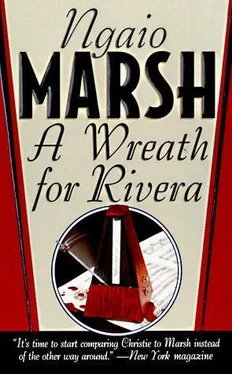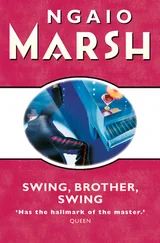In the office a telephone bell rang. Fox went in to answer it and was heard uttering words of reproach. He came out looking scandalized.
“It’s that new chap we sent back with his lordship’s party. Marks. And what do you suppose he’s done?” Fox glared round upon his audience and slapped the palm of his hand on the table. “Silly young chump! When they get in they say they’re all going to the drawing-room. ‘Oh,’ says Marks, ‘then it’s my duty, if you please, to accompany you.’ The gentlemen say they want to retire first, and they go off to the downstairs cloak-room. The ladies have the same idea and they go upstairs and Sergeant Expeditious Marks tries to tear himself in halves which is nothing to what I’ll do for him. And while he’s exhausting himself running up and down keeping observation, what happens? One of the young ladies slips down the servants’ stairs and lets herself out by the back door.”
“Which one?” Alleyn asked quickly.
“Don’t,” said Mr. Fox with bitter scorn, “ask too much of Detective-Sergeant Marks, sir. Don’t make it too tough. He wouldn’t know which one. Oh, no. He comes bleating to the phone while I daresay the rest of ’em are lighting off wherever the fancy takes ’em. Sergeant ruddy Police-College Marks! What is it?”
A uniformed constable had come in from the front entrance. “I thought I’d better report, sir,” he said. “I’m on duty outside. There’s an incident.”
“All right,” said Alleyn. “What incident?”
“A taxi’s pulled up some distance away, sir, and a lady got out.”
“A lady?” Fox demanded so peremptorily that the constable glanced nervously at him.
“Yes, Mr. Fox. A young lady. She spoke to the driver. He’s waiting. She looked round and hesitated. I was in the entrance, sir, well in the shadow, and I don’t think she saw me.”
“Recognize her?” Alleyn asked.
“I wouldn’t be sure, sir. The clothes are different but I reckon it’s one of the ladies in Lord Pastern’s party.”
“Have you locked the doors behind you?”
“Yes, sir.”
“Unlock them and make yourself scarce. Clear out, all of you. Scatter. Step lively.”
The foyer was emptied in five seconds. The doors into the office and band-room closed noiselessly. Alleyn darted to the light switches. A single lamp was left to glow pinkly against the wall. The foyer was filled with shadow. He slipped to his knees behind a chair in the corner farthest from the light.
The clock ticked discreetly. Somewhere in a distant basement a pail clanked and a door slammed. Innumerable tiny sounds closer at hand became evident: the tap of a blind cord somewhere in the restaurant, a stealthy movement and scuffle behind the walls, an indefinable humming from the main switchboard. Alleyn smelt carpet, upholstery, disinfectant, and stale tobacco. Entrance into the foyer from outside must be effected through two sets of doors — those giving on the street and those inside made of plate glass and normally open but now swung-to. Through these he could see only a vague greyness crossed by reflections in the glass itself. The image of the one pink lamp floated midway up the right-hand pane. He fixed his gaze on this. Now, beyond the glass doors, there came a paleness. The street door had been opened.
The face appeared quite suddenly against the plate glass, obscuring the reflected lamp and distorted by pressure. One door squeaked faintly as it opened.
She stood for a moment, holding her head scarf half across her face. Then she moved forward swiftly and was down on her knees before an armchair. Her finger-nails scrabbled on its tapestry. So intent was she upon her search that she did not hear him cross the thick carpet behind her, but when he drew the envelope from his pocket it made a slight crackle. Still kneeling, she swung round, saw him and cried out sharply.
“Is this what you are hunting for, Miss Wayne?” Alleyn asked.
He crossed over to the wall and switched up the lights. Without moving, Carlisle watched him. When he returned he still held the envelope. She put her hand to her burning face and said unsteadily: “You think I’m up to no good, I suppose. I suppose you want an explanation.”
“I should be glad of an answer to my question. Is this what you want?”
He held the envelope up, but did not give it to her. She looked at it doubtfully. “I don’t know — I don’t think — ”
“The envelope is mine. I’ll tell you what it contains. A letter that had been thrust down between the seat and the arm of the chair you have been exploring.”
“Yes,” Carlisle said. “Yes. That’s it. May I have it, please?”
“Do sit down,” Alleyn rejoined. “We’d better clear this up, don’t you think?”
He waited while she rose. After a moment’s hesitation, she sat in the chair.
“You won’t believe me, of course,” she said, “but that letter — I suppose you have read it, haven’t you — has nothing whatever to do with this awful business to-night. Nothing in the wide world. It’s entirely personal and rather important.”
“Have you even read it?” he asked. “Can you repeat the contents? I should like you to do that, if you will.”
“But — not absolutely correctly — I mean — ”
“Approximately.”
“It — it’s got an important message. It concerns someone — I can’t tell you in so many words — ”
“And yet it’s so important that you return here at three o’clock in the morning to try and find it.” He paused but Carlisle said nothing. “Why,” he said, “didn’t Miss de Suze come and collect her own correspondence?”
“Oh dear!” she said. “This is difficult.”
“Well, for pity’s sake keep up your reputation and be honest about it.”
“I am being honest, damn you!” said Carlisle with spirit. “The letter’s a private affair and — and — extremely confidential. Félicité doesn’t want anyone to see it. I don’t know exactly what’s in it.”
“She funked coming back herself?”
“She’s a bit shattered. Everyone is.”
“I’d like you to see what the letter’s about,” said Alleyn after a pause. She began to protest. Very patiently he repeated his usual argument. When someone had been killed the nicer points of behaviour had to be disregarded. He had to prove to his own satisfaction that the letter was immaterial and then he would forget it. “You remember,” he said, “this letter dropped out of her bag. Did you notice how she snatched it away from me? I see you did. Did you notice what she did after I said you would all be searched? She shoved her hand down between the seat and arm of the chair. Then she went off to be searched and I sat in the chair. When she came back she spent a miserable half-hour fishing for the letter and trying to look as if she wasn’t. All right.”
He drew the letter from the envelope and spread it out before her. “It’s been finger-printed,” he said, “but without any marked success. Too much rubbing against good solid chair-cover. Will you read it or — ”
“Oh, all right,” Carlisle said angrily.
The letter was typed on a sheet of plain notepaper. There was no address and no date.
My Dear [Carlisle read]: Your loveliness is my undoing. Because of it I break my deepest promise to myself and to others. We are closer than you have ever dreamed. I wear a white flower in my coat to-night. It is yours. But as you value our future happiness, make not the slightest sign — even to me. Destroy this note, my love, but keep my love. G.P.F.
Carlisle raised her head, met Alleyn’s gaze and avoided it quickly. “A white flower,” she whispered. “G.P.F.? G.P.F .? I don’t believe it.”
“Mr. Edward Manx had a white carnation in his coat, I think.”
Читать дальше






